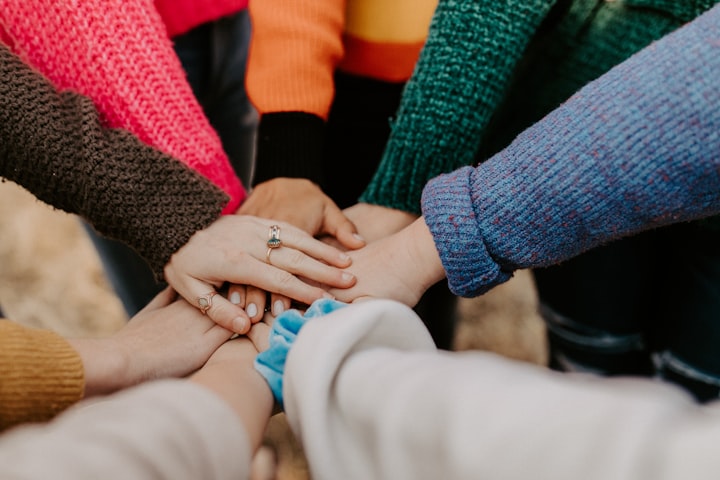
In a world that is often characterized by division, strife, and discord, the idea that we are all brothers and sisters due to the commonality of our red blood may seem like a simple, even idealistic notion. However, beneath its apparent simplicity lies a profound truth that transcends cultural, racial, and national boundaries. The idea that we are all connected by our shared humanity, by our common biology, and by the fundamental attributes that define us as a species is one that should be celebrated and cherished. This sentiment should not be dismissed as mere idealism, but rather, it should serve as the foundation for a more inclusive, compassionate, and harmonious world.
The concept of brotherhood and sisterhood, the idea that we are all part of one human family, is not new. It has echoed throughout history in various forms, from religious teachings to philosophical doctrines. And yet, despite its prevalence, it is often overshadowed by the divisions and prejudices that persist in society. It is crucial to revisit and reaffirm this idea in the contemporary context, reminding ourselves that we are all brothers and sisters bound together by the undeniable fact that our blood is red.
Our shared humanity, the essence of our existence, is evident in the fact that we all possess the same biological markers that define us as Homo sapiens. Our blood, the life-giving fluid that courses through our veins, is indeed red for each and every one of us. It doesn't matter whether we are from Africa, Asia, Europe, or any other corner of the globe; our blood is universally crimson. This biological similarity is not a coincidence but rather the result of millions of years of evolution. Our common ancestry, traced back to a common human origin in Africa, binds us together at the genetic level.
When we recognize that our blood is red, we are acknowledging a biological truth that transcends the superficial differences that have been the source of so much conflict throughout history. Differences in skin color, language, culture, and belief have often been used to justify discrimination, prejudice, and even violence. However, when we focus on the shared reality of our red blood, we shift our perspective to what unites us, rather than what divides us. It becomes abundantly clear that no matter how diverse our backgrounds may be, we all share the same vital essence that sustains our lives.
Moreover, the idea that we are all brothers and sisters due to our red blood is not limited to the physical realm. It extends to our emotional and psychological aspects as well. Emotions are a universal language that knows no boundaries. Love, joy, sorrow, fear, and empathy are experiences that resonate with all human beings, regardless of their cultural or ethnic backgrounds. The pain of loss, the happiness of celebration, the fear of the unknown – these emotions are shared by every person on this planet. When we understand this, we begin to appreciate the depth of our connections to one another.
It is essential to emphasize that recognizing our common bond as brothers and sisters is not a call to homogenize or erase our differences. Rather, it is an invitation to celebrate our diversity within the framework of our shared humanity. Our differences in language, culture, and tradition enrich the tapestry of human existence. They offer us opportunities for learning, growth, and mutual understanding. When we view these differences through the lens of brotherhood, we are more inclined to appreciate and learn from one another, rather than fear or resent one another.
Another powerful dimension of the idea that our blood is red is the opportunity it provides for empathy and compassion. When we see someone suffering, when we witness the pain of another, we should remember that their blood is red just like ours. This recognition can be a powerful catalyst for empathy and a motivation to alleviate the suffering of our fellow human beings. It fosters a sense of responsibility to help those in need, regardless of their background. After all, if we were in their place, we would hope for the same compassion and support.
In a world that faces significant challenges, from global inequality to environmental crises, the idea that we are all brothers and sisters has never been more relevant. These challenges do not discriminate based on race, nationality, or religion. They affect all of us. The degradation of the environment threatens the well-being of every living being on this planet. Economic disparities, political conflicts, and the displacement of communities affect individuals regardless of their ethnicity. In this context, recognizing our shared brotherhood is not just a moral imperative; it is a practical necessity. It underscores the urgency of working together as a global community to address these issues effectively.
Moreover, acknowledging our common brotherhood is a powerful antidote to the divisiveness and polarization that have been on the rise in recent years. By focusing on what unites us, rather than what divides us, we can bridge the gaps that separate us. We can find common ground on which to build understanding and collaboration. This is not to say that all conflicts and disagreements will disappear, but it offers a foundation for dialogue, negotiation, and compromise.
The idea that we are all brothers and sisters because our blood is red is a source of hope. It reminds us that we are not alone in this world, that we have a shared destiny, and that we can collectively strive for a better future. It is a reminder that, despite our differences, we are all passengers on the same spaceship Earth. Our destinies are intertwined, and our actions have consequences that ripple across the globe. This awareness should inspire us to work together to address the pressing issues of our time, from climate change to poverty, from conflict resolution to global health.
In conclusion, the notion that we are all brothers and sisters because our blood is red is a profound and enduring truth that should be celebrated and embraced. It transcends the superficial differences that have divided us for too long and calls us to recognize our shared humanity. It invites us to be compassionate and empathetic towards one another, to celebrate our diversity, and to work together for a better future. In a world that often seems fragmented and fractured, this idea serves as a unifying force, reminding us that we are all part of the same human family, bound together by the commonality of our red blood. It is a message of hope and a call to action, urging us to build a more inclusive, compassionate, and harmonious world for all.
About the Creator
Elias
Reading serves as a gateway to knowledge, offering a vast universe of ideas, information, and inspiration waiting to be explored. It is a powerful tool that opens doors, ignites curiosity, and fuels personal and intellectual growth.






Comments
There are no comments for this story
Be the first to respond and start the conversation.